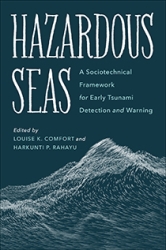
Louise K. Comfort
Louise K. Comfort is Professor Emerita and former Director, Center for Disaster Management, Graduate School of Public and International Affairs, University of Pittsburgh. She served as Principal Investigator of the National Science Foundation project, #1331463, “Hazards SEES Type 2: From Sensors to Tweeters: A Sustainable Sociotechnical Approach for Detecting, Mitigating, and Building Resilience to Hazards,” and the supplementary Swiss Re Foundation grants, “Deploying and Testing–Early Tsunami Warning System,” November 20, 2018, to December 31, 2019;“Deploy, Test,Prototype Early Tsunami Detection and Warning System” January 1, 2020, to November 31, 2021;and “COVID-19 Relief,” June–August 2020,that funded this research. She is a Fellow of the National Academy of Public Administration since 2006. Her recent books include The Dynamics of Risk: Changing Technologies and Collective Action in Seismic Events (Princeton University Press, 2019) and Global Risk Management: The Role of Collective Cognition in Response to COVID-19, coedited with Mary Lee Rhodes, University of Dublin (Routledge Publications, 2022). Louise Comfort has worked collaboratively with Indonesian colleagues for more than 18 years.

